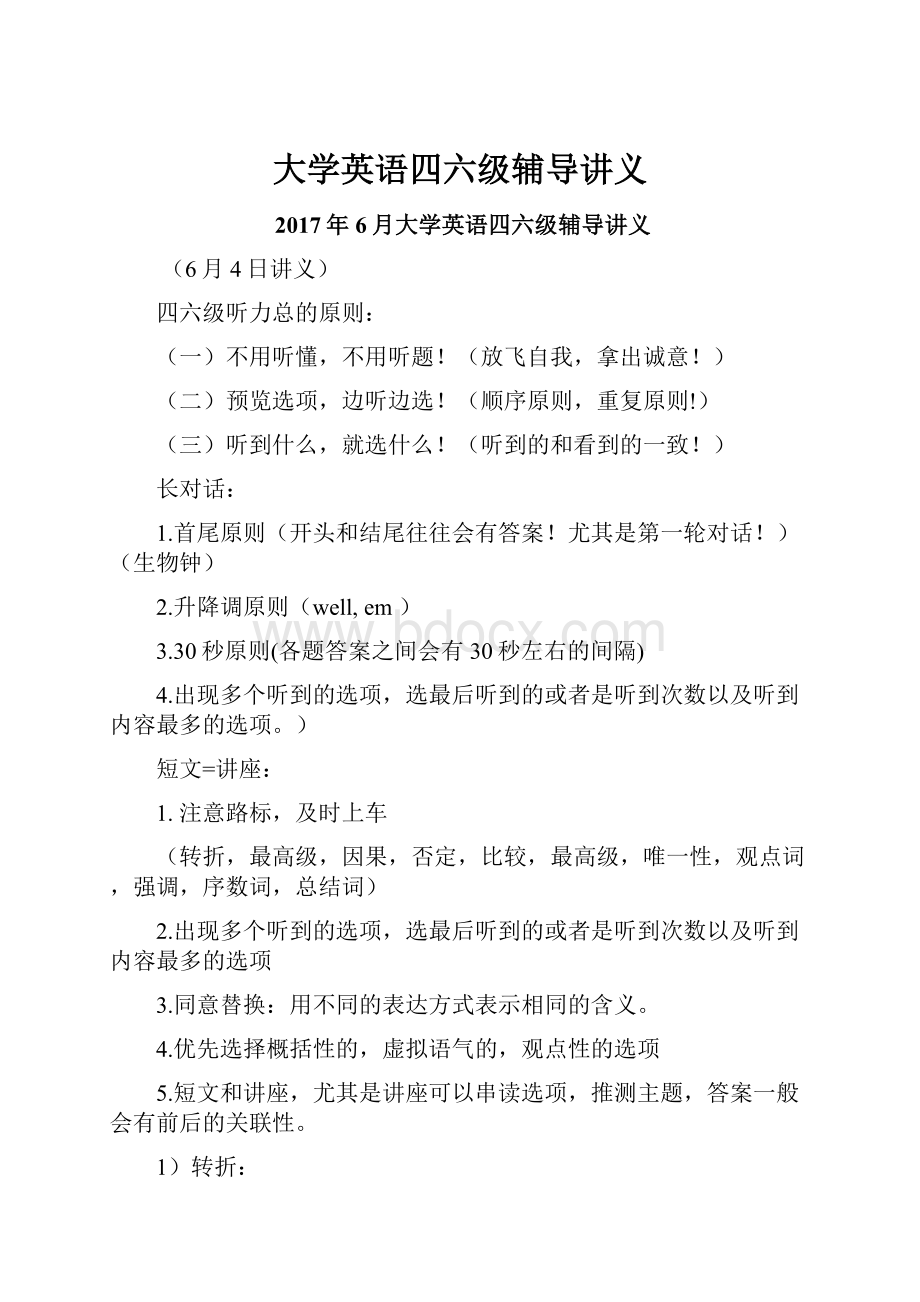大学英语四六级辅导讲义.docx
《大学英语四六级辅导讲义.docx》由会员分享,可在线阅读,更多相关《大学英语四六级辅导讲义.docx(27页珍藏版)》请在冰豆网上搜索。

大学英语四六级辅导讲义
2017年6月大学英语四六级辅导讲义
(6月4日讲义)
四六级听力总的原则:
(一)不用听懂,不用听题!
(放飞自我,拿出诚意!
)
(二)预览选项,边听边选!
(顺序原则,重复原则!
)
(三)听到什么,就选什么!
(听到的和看到的一致!
)
长对话:
1.首尾原则(开头和结尾往往会有答案!
尤其是第一轮对话!
)(生物钟)
2.升降调原则(well,em)
3.30秒原则(各题答案之间会有30秒左右的间隔)
4.出现多个听到的选项,选最后听到的或者是听到次数以及听到内容最多的选项。
)
短文=讲座:
1.注意路标,及时上车
(转折,最高级,因果,否定,比较,最高级,唯一性,观点词,强调,序数词,总结词)
2.出现多个听到的选项,选最后听到的或者是听到次数以及听到内容最多的选项
3.同意替换:
用不同的表达方式表示相同的含义。
4.优先选择概括性的,虚拟语气的,观点性的选项
5.短文和讲座,尤其是讲座可以串读选项,推测主题,答案一般会有前后的关联性。
1)转折:
but,however,nevertheless,while,infact,whereas,unexpectedly,unfortunately,yet,except,ontheotherhand,comparedto,unlike,instead,incontrastto等despite,inspiteof,although,though
2)最高级
Themost,thegreatestchief/primary/main/leading
3)因果
Because,so,therefore,asaresult;since,dueto;becauseof;therefore,thus,so
4)比较
ThanIexpected
5)唯一性
Only,
only/unique/prefer/perfect
6)观点词
①Scientist/psychologist/expert/professor做主语
②Believe/found/estimate/pointout/suggest/mean/explain做谓语
③Research/studies/,survey/finding做主语
④Indicate/show/review/are/explain/prove/mean/做谓语
7)强调
(1)含义强调:
specially,especially,indeed,certainly,only,certainly
(2)解释原则:
whichis,thatis,whichmeans,thatistosay
(3)举例强调:
forexample,forinstance,suchas,illustrate
(4)结论强调:
aboveall,inshort,inaword,inconclusion,allinall,inbrief
(5)重复强调:
短文中重复率很高的词或者概念往往就是该短文的主题。
(阅读)
具体讲解:
1.边听边选,预览选项
在听的时候一定要
2.重心靠前,反应要快
尤其是新闻听力,一定是前两句就会有答案出现;前两句就是导语;
长对话和短篇新闻的第一题答案,一般都在前三句就出现,所以,我们比谁反应更快,不比谁更聪明;
3.视听一致,直接选择
听到什么选什么,听到的和看到的一致时就可以选;
4.反复出现,坚决下手
如果某个选项出现反复听到的词就可以直接选择。
有的题目中,几个选项都被读到了,别哭,冷静一下,看看哪个选项被读到的最多即可;
当然在讲座题目中最后听到的才是正确答案。
5.注意路标,及时上车
(转折,最高级,因果,否定,比较,最高级,唯一性,观点词,强调,序数词,总结词)
1)转折:
but,however,nevertheless,while,infact,whereas,unexpectedly,unfortunately,yet,except,ontheotherhand,comparedto,unlike,instead,incontrastto等despite,inspiteof,although,though
2)最高级
Themost,thegreatestchief/primary/main/leading
3)因果
Because,so,therefore,asaresult;since,dueto;becauseof;therefore,thus,so
4)比较
ThanIexpected
5)唯一性
Only,
only/unique/prefer/perfect
6)观点词
①Scientist/psychologist/expert/professor做主语
②Believe/found/estimate/pointout/suggest/mean/explain做谓语
③Research/studies/,survey/finding做主语
④Indicate/show/review/are/explain/prove/mean/做谓语
7)强调
(1)含义强调:
specially,especially,indeed,certainly,only,certainly
(2)解释原则:
whichis,thatis,whichmeans,thatistosay
(3)举例强调:
forexample,forinstance,suchas,illustrate
(4)结论强调:
aboveall,inshort,inaword,inconclusion,allinall,inbrief
(5)重复强调:
短文中重复率很高的词或者概念往往就是该短文的主题。
1.顺序原则
听力出题的顺序和听到的内容顺序一致:
都是从前往后顺序出现的。
做题时应该根据顺序原则定位。
2.同义替换正确选项和对应的听力原文答案句存在同义替换现象,六级听力中尤其常见。
3.转折处常设出题点语音语调变化,如升降调表疑问、表转折等处常设考点。
相应地在做题时,应该注重抓听以下标志词:
最高级标志词
在文章读到最后,问题开始读中间会有一定时间的停顿。
这个停顿相当重要,使得我们明确文章结束以及最后说的什么。
结尾也容易设置考点,询问事情的最终结果。
三、观点原则:
需要注意文章中表示观点的句子,通常出现在例子之前,某人或机构的看法。
这些句子通常带有以下特征:
分析:
C、D选项结构一样,表达意义相反。
正确答案应该在C和D选项中。
第三招:
视听一致原则
被读到单词(个数+次数)最多的选项是正确答案
还以上面这道4级真题为例,听力原文如下:
W:
Hesaidhe'dnevertextmessage.Hethinksit'sverychildishandunprofessionaltotextmessage.M:
Yeah,Icanseewhathemeans.It'sconsideredprettyinformaltotextmessagesomeone.
刚才我们通过相近相反原则已经确定答案在C和D中,听到childishandunprofessional可以直接选出。
C)Itischildishandunprofessional.
D)Itiscoolandconvenient.
提醒:
如果有2个选项均有多个单词被读到,那么标记被读到的单词次数。
哪个选项单词被读到的次数最多,哪个就是正确选项!
第四招:
概括、抽象保留原则
当选项中出现比较概括、抽象的句子时,这时我们就要把表述事实的、具体的句子划掉,而去选择表概、抽象、比较性的句子!
此原则可衍生出一个包含取大的原则,在作题时应用也是十分的广泛,一般当两个选项的意思接近时,表述比较全面的一般为正确选项!
典型例题:
A)Thevisitingeconomisthasgivenseverallectures.
B)Theguestlecturer’sopinionisdifferentfromDr.Johnson’s.
C)Dr.Johnsonandtheguestspeakerwereschoolmates.
D)Dr.Johnsoninvitedtheeconomisttovisittheircollege.
分析:
A、C、D均为表述事实的句子,只有B项为对比、比较的句子,较之A、C、D项更为抽象的表述了一件事情,所以B项为正确选项!
第五招:
态度和虚拟保留原则
这两种方法一般无单独命题的规律性,只是作为上述四种宏观方法的辅助方法出现,当只剩下两个选项时,通常正态度的选项容易是正确答案,表虚拟的选项更容易是正确答案!
6.语调变化,必有答案(well,em)
7.结尾之处,常有答案(结尾会有停顿)
8.正确答案,yesorno
大部分人容易纠结听不懂的东西,但是听力的答案往往存在于最简单的语句中。
听懂yes和no,要比拼了老命听懂后面莫名其妙的话有用多了;
9.顺序原则,同意替换
10.相近原则,相反原则
相近似的选项必选其一,
当选项中有两项表达意思相近时,那么正确答案必在这两项之中!
这时只需稍微听一听对话,即可知答案,如果出现了双重相关,便可直接确认正确选项,只需听完对话加之认证一下即可!
典型真题:
2016年6月六级听力第10题
A)Theywillfeellesspressuretoraiseemployees'wages.
B)Theywillfeelfreetochoosethemostsuitableemployees.
C)Theywillfeelinclinedtoexpandtheirbusinessoperations.
D)Theywillfeelmoreconfidentincompetingwiththeirrivals.
分析:
A、B两项均含有theywillfeel和employees,相比其他两项更具相关性,正确答案应该在A和B选项中。
当选项中有两项表达意思相反时,那么正确答案必在这两项之中!
典型真题:
2016年6月四级听力第11题
A)Itposesachallengetoseniors.
B)Itsavesbothtimeandmoney.
C)Itischildishandunprofessional.
D)Itiscoolandconvenient.
W:
Hesaidhe'dnevertextmessage.Hethinksit'sverychildishandunprofessionaltotextmessage.M:
Yeah,Icanseewhathemeans.It'sconsideredprettyinformaltotextmessagesomeone.
刚才我们通过相近相反原则已经确定答案在C和D中,听到childishandunprofessional可以直接选出。
C)Itischildishandunprofessional.
D)Itiscoolandconvenient.
11.概括优先,具体排除(观点)
当选项中出现比较概括、抽象的句子时,这时我们就要把表述事实的、具体的句子划掉,而去选择表概、抽象、比较性的句子!
此原则可衍生出一个包含取大的原则,在作题时应用也是十分的广泛,一般当两个选项的意思接近时,表述比较全面的一般为正确选项!
A)Thevisitingeconomisthasgivenseverallectures.
B)Theguestlecturer’sopinionisdifferentfromDr.Johnson’s.
C)Dr.Johnsonandtheguestspeakerwereschoolmates.
D)Dr.Johnsoninvitedtheeconomisttovisittheircollege.
分析:
A、C、D均为表述事实的句子,只有B项为对比、比较的句子,较之A、C、D项更为抽象的表述了一件事情,所以B项为正确选项!
12.虚拟态度,一锤定音
这两种方法一般无单独命题的规律性,只是作为上述四种宏观方法的辅助方法出现,当只剩下两个选项时,通常正态度的选项容易是正确答案,表虚拟的选项更容易是正确答案!
一、ListeningComprehension:
权威真题:
长对话:
Questions1to4arebasedontheconversationyouhavejustheard.
1.A)Projectorganizer.B)Publicrelationsofficer.
C)MarketingmanagerD)Marketresearchconsultant.
2.A)Quantitativeadvertisingresearch.B)Questionnairedesign.
C)Researchmethodology.D)Interviewertraining.
3.A)Theyareintensivestudiesofpeople’sspendinghabits.
B)Theyexaminerelationsbetweenproducersandcustomers.
C)Theylookfornewandeffectivewaystopromoteproducts.
D)Theystudytrendsorcustomersatisfactionoveralongperiod.
4.A)Thelackofpromotionopportunity.B)Checkingchartsandtables.
C)Designingquestionnaires.D)Thepersistentintensity.
听力原文:
ConversationOne
M:
(1)SohowlonghaveyoubeenaMarketResearchConsultant?
W:
Well,Istartedstraightafterfinishinguniversity.
M:
Didyoustudymarketresearch?
W:
Yeah,anditreallyhelpedmetogetintotheindustry,butIhavetosaythatit’smoreimportanttogetexperienceindifferenttypesofmarketresearchtofindoutexactlywhatyou’reinterestedin.
M:
Sowhatareyouinterestedin?
W:
Well,
(2)atthemoment,Ispecializeinquantitativeadvertisingresearch,whichmeansthatIdotwotypesofprojects.(3)Trackersareongoingprojectsthatlookattrendsorcustomersatisfactionoveralongperiodoftime.Theonlyproblemwithtrackersisthatittakesupalotofyourtime.Butyoudobuildupagoodrelationshipwiththeclient.Ialsodoacoupleofad-hocjobswhicharemuchshorterprojects.
M:
Whatexactlydoyoumeanbyad-hocjobs?
W:
It’sbasicallywhencompaniesneedquickanswerstotheirquestionsabouttheirconsumers’habits.Theyjustaskforonequestionnairetobesentoutforexample,sothetimeyouspendonanad-hocprojecttendstobefairlyshort.
M:
Whichdoyouprefer,trackersorad-hoc?
W:
IlikedoingbothandinfactIneedtodobothatthesametimetokeepmefromgoingcrazy.Ineedthevariety.
M:
Canyoujustexplainwhatprocessyougothroughwithanewclient?
W:
Well,togetherwedecideonthemethodologyandtheobjectivesoftheresearch.Ithendesignaquestionnaire.Oncetheinterviewershavebeenbriefed,Isendtheclientascheduleandthentheygetbacktomewithdeadlines.Oncethefinalchartsandtablesareready,Ihavetocheckthemandorganizeapresentation.
M:
Hmm,onelastquestion,whatdoyoulikeanddislikeaboutyourjob?
W:
AsIsaid,varietyisimportantand(4)asforwhatIdon’tlike,ithastobethecheckingofchartsandtables.
1.Whatpositiondoesthewomanholdinthecompany?
2.Whatdoesthewomanspecializeinatthemoment?
3.Whatdoesthewomansayabouttrackers?
4.Whatdoesthewomandislikeaboutherjob?
Questions5to8arebasedontheconversationyouhavejustheard.
5.A)HisviewonCanadianuniversities.
B)Hisunderstandingofhighereducation.
C)Hissuggestionsforimprovementsinhighereducation.
D)HiscomplaintaboutbureaucracyinAmericanuniversities.
6.A)Itiswelldesigned.
B)Itisratherinflexible.
C)Itvariesamonguniversities.
D)Ithasundergonegreatchanges.
7.A)TheUnitedStatesandCanadacanlearnfromeachother.
B)Publicuniversitiesareoftensuperiortoprivateuniversities.
C)Everyoneshouldbegivenequalaccesstohighereducation.
D)Privateschoolsworkmoreefficientlythanpublicinstitutions.
8.A)Universitysystemsvaryfromcountrytocountry.
B)Efficiencyisessentialtouniversitymanagement.
C)Itishardtosaywhichisbetter,apublicuniversityoraprivateone.
D)ManyprivateuniversitiesintheU.S.areactuallylargebureaucracies.
听力原文:
ConversationTwo
W:
Hello,I’mherewithFrederick.NowFred,youwenttouniversityinCanada?
M:
Yeah,that’sright.
W:
OK,and(5)youhaveverystrongviewsaboutuniversitiesinCanada.Couldyoupleaseexplain?
M:
Well,wedon’thaveprivateuniversitiesinCanada.They’reallpublic.(6)Alltheuniversitiesareownedbythegovernment,sothereistheMinistryofEducationinchargeofcreatingthecurriculumfortheuniversitiesandsothereisnotmuchroomforflexibility.Sinceit’sagovernmentoperatedinstitution,thingsdon’tmoveveryfast.Ifyouwantsomethingtobedone,thentheirstaffdonothavesomuchincentivetohelpyoubecausehe’saworkerforthegovernment.SoIdon’tthinkit’sveryeff